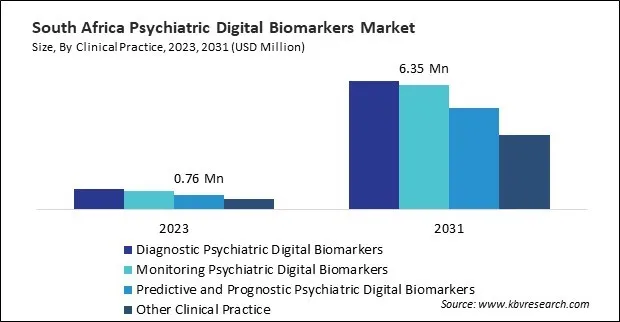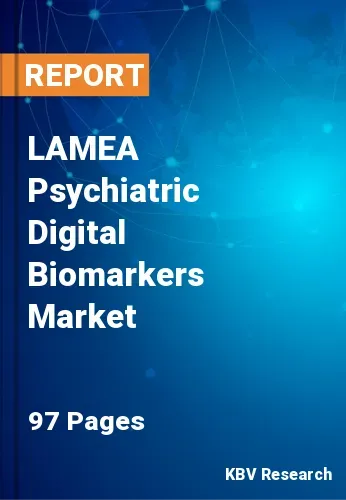The Latin America, Middle East and Africa Psychiatric Digital Biomarkers Market would witness market growth of 26.4% CAGR during the forecast period (2024-2031).
The Brazil market dominated the LAMEA Psychiatric Digital Biomarkers Market by Country in 2023, and would continue to be a dominant market till 2031; thereby, achieving a market value of $50 million by 2031. The Argentina market is expected to witness a CAGR of 27.4% during (2024 - 2031). Additionally, The UAE market is expected to witness a CAGR of 25.3% during (2024 - 2031).

Virtual care platforms and wearable devices further enhance the integration of psychiatric digital biomarkers. Telehealth services use data from wearables, such as physiological metrics and behavioral patterns, to support remote mental health monitoring and informed treatment decisions. Wearables provide real-time insights into mental health conditions, allowing for proactive interventions. Together, these components of the digital health ecosystem create a robust framework for improving mental health care, making it more inclusive, precise, and accessible for diverse populations.
The growing aging population is significantly impacting the prevalence of age-related psychiatric conditions, necessitating the development of innovative diagnostic tools and solutions. As life expectancy increases worldwide, so does the number of older adults, many of whom are at heightened risk for mental health disorders, including dementia, depression, and anxiety.
In South America, the Pan American Health Organization (PAHO) highlights the profound impact of mental, neurological, substance use disorders, and suicide (MNSS) in Brazil. These conditions account for 19% of all disability-adjusted life years (DALYs) and 38% of all years lived with disability (YLDs) in the country. Mental and behavioral problems are the third leading cause of sick leave, comprising 52% of all social benefits disbursed between 2007 and 2017. Mood disorders alone represent around half of these claims. As of October 2020, an estimated 65,453 employees were on temporary leave due to mental illness, constituting approximately 8% of all paid sick leave benefits. Additionally, 284,292 Brazilians are retired due to mental health conditions, reflecting the long-term socioeconomic impact of these disorders. Therefore, these challenges underscore the urgent need for innovative psychiatric digital biomarkers to facilitate early detection, monitoring, and intervention for mental health conditions in the LAMEA region.
Free Valuable Insights: The Worldwide Psychiatric Digital Biomarkers Market is Projected to reach USD 2.78 Billion by 2031, at a CAGR of 24.1%
Based on Type, the market is segmented into Wearable, Mobile based Applications, Sensors, and Other Type. Based on Clinical Practice, the market is segmented into Diagnostic Psychiatric Digital Biomarkers, Monitoring Psychiatric Digital Biomarkers, Predictive and Prognostic Psychiatric Digital Biomarkers, and Other Clinical Practice. Based on End Use, the market is segmented into Healthcare Companies, Healthcare Providers, Payers, and Other End Use. Based on countries, the market is segmented into Brazil, Argentina, UAE, Saudi Arabia, South Africa, Nigeria, and Rest of LAMEA.

By Type
By Clinical Practice
By End Use
By Country
Our team of dedicated experts can provide you with attractive expansion opportunities for your business.

